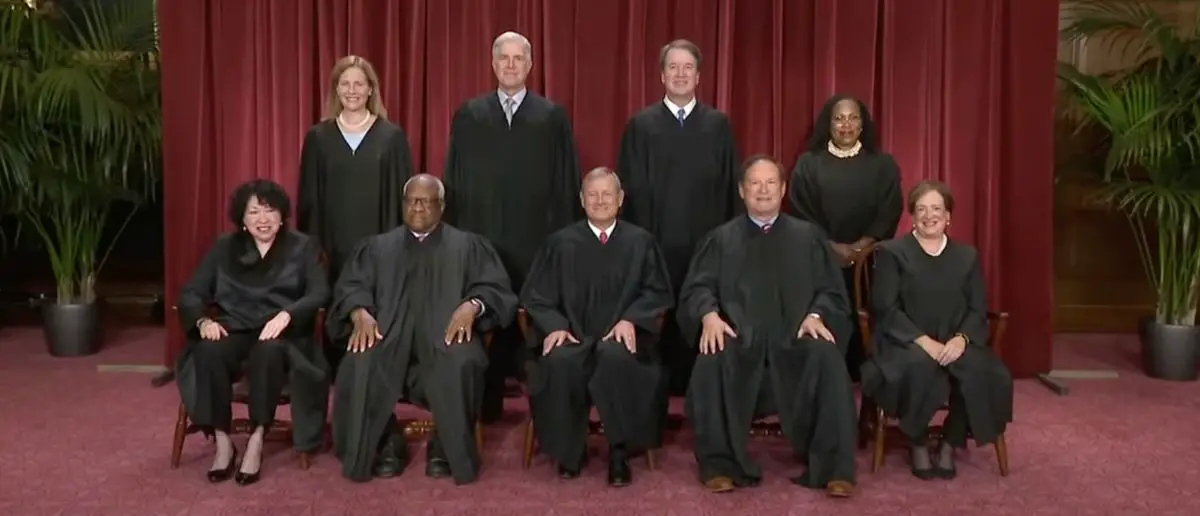
The election is just weeks away. One swing state has everyone on edge.
And even the U.S. Supreme Court Justices are stunned by what’s happening in this swing state.
In September, a county judge in Georgia handed down a ruling to effectively place an injunction on a Georgia law that would ban abortions in most cases after six weeks of a pregnancy. The ruling was a major development that most did not see coming, and put the proponents of the pro-life law on their heels trying to figure out what to do next.
Well now the Georgia Supreme Court has decided that the lower court judge was flat-out wrong and has decided to uphold the law, allowing it to be enforced once again. This news likely has the U.S. Supreme Court surprised and interested in whether this case will make it to their footsteps sooner rather than later.
Georgia Supreme Court Upholds Six-Week Abortion Ban
In a pivotal legal decision, the Georgia Supreme Court ruled on September 30 to uphold the state’s six-week abortion ban, granting an indefinite stay while the state reviews an appeal of a lower court’s ruling that had previously deemed the ban unconstitutional. Fulton County Superior Court Judge Robert McBurney had argued that the six-week restriction violated the state Constitution, asserting that its protections of liberty allow women to obtain an abortion up to the point of viability.
The Supreme Court’s ruling stated: “The State of Georgia’s Emergency Petition for Supersedeas seeking a stay of the order of the Superior Court of Fulton County in the above-styled action is hereby GRANTED with respect to OCGA § 16-12-141, except as to OCGA § 16-12-141 (f). The State of Georgia’s Emergency Petition for Supersedeas seeking a stay of the order of the Superior Court of Fulton County in the above-styled action is hereby GRANTED with respect to OCGA § 31-9B-3 (a). To the extent the State also seeks an ‘administrative stay,’ that motion is dismissed as moot.”
🚨Just in: The Georgia's Supreme Court has reinstated the state's ban on abortions after about six weeks of pregnancy. pic.twitter.com/yZ0ILftMpB
— The Calvin Coolidge Project (@TheCalvinCooli1) October 7, 2024
In his dissent, Justice John J. Ellington criticized the state for failing to provide a justification for the immediate stay of the lower court’s decision.
The previous ruling by Judge McBurney had allowed abortions up to approximately 20 weeks of pregnancy. Following that decision, Georgia Attorney General Chris Carr quickly announced an appeal to the state Supreme Court in an effort to maintain the six-week ban.
Originally signed into law by Republican Governor Brian Kemp in May 2019, the six-week abortion ban officially took effect in 2022 after the U.S. Supreme Court overturned Roe v. Wade. The law prohibits abortions once a fetal heartbeat can be detected, which typically occurs around six weeks of gestation, allowing for exceptions only to protect the mother’s life.
This ruling reflects the ongoing and contentious legal battles surrounding abortion rights in Georgia and across the nation, as states navigate the implications of recent Supreme Court decisions.
U.S. Supreme Court Paying Close Attention To Georgia Abortion Litigation
The U.S. Supreme Court has been busy with litigation on the abortion issue, and they will likely be forced to step in on this matter with Georgia, unless they deem the Georgia Supreme Court precedent to be enough for the matter and are uninterested in providing a national precedence.
If more states continue to spar over abortion legislation and the constitutionality of the duly-passed state legislation on abortion, the U.S. Supreme Court will no doubt have to take up a case and at least somewhat address the issue.
The U.S. Supreme Court Justices just decided to not interject themselves in a Texas case in which the Biden administration tried to prevent a Texas law from being enforced which will ban most abortions. The High Court determined that the 5th Circuit Court of Appeals decision was sufficient in the case, which ruled in favor of Texas.
In that ruling, the Fifth Circuit Court of Appeals noted that health professionals do not have to intentionally end a pregnancy to save the life of a mother. In other words, they agree with the commonly held belief of doctors that abortion is not a medical necessity.
‼️ Abortion is never medically necessary. ‼️
In emergency situations, some babies may need to be delivered early.
In these cases, everything is done to attempt to save the baby.
There is no scenario in which dismembering, poisoning, or crushing a baby is medically necessary. pic.twitter.com/xpRTitbyfb
— Lila Rose (@LilaGraceRose) October 20, 2020
Stay tuned to the DC Daily Journal for more updates on this Georgia abortion case.





